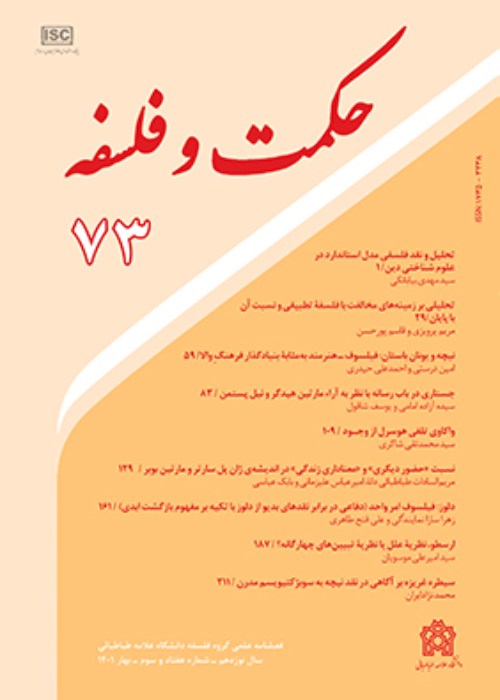An Assessment of the Views of Some Muslim Philosophers to Emanation or Making
Author(s):
Abstract:
The present article is an attempt to assess the views of those philosophers who are the exponents or founders of a particular school of thought on emanation or making. In the beginning, it seems that we can generally divide the philosophers only into two groups: one group consider causality and making in its usual sense within the framework of multiplicity and differences of beings, hence consider making as emanation, which results in the expansion of the scope of being or beings. The other group with respect to the pure unity of being think that the augmentation of the scope of being is impossible and interpret causality as manifestation or expression of that pure one being. But, despite this initial impression, we will find that in the second group thinkers like Mulla Sadra, despite their notion of the oneness of being and considering the exalted origin of being as al-fail bil-tajalli (agent by expression), advocated the possibility of being made the nature of being, and this idea is a noticeable view. On the other hand, we have philosophers, like Suhrawardi, who consider quiddities as made, and unlike others founded a system based on 'light' rather than 'being' or 'existence', and at the same time think about both 'light' and 'darknes's as something emanated or made. In this way, practically we are concerned with philosophers with different strains in this regard. Even if they are included within the first two divisions, because of their particular features, they will be separated from others in other sub-divisions. At the end, we will conclude that some philosophers never carried out a profound and comprehensive study on the meaning of emanation and making as fitted with rational and philosophical standards, and it seems that they dealt with the issue of causality insufficiently. With reference to their effective foundation, we considered that issue in order to show that some of them even failed to base this issue on their own ontology, so that they had two different approaches.
Language:
Persian
Published:
Wisdom and Philosophy, Volume:8 Issue: 1, 2012
Page:
47
magiran.com/p997466
دانلود و مطالعه متن این مقاله با یکی از روشهای زیر امکان پذیر است:
اشتراک شخصی
با عضویت و پرداخت آنلاین حق اشتراک یکساله به مبلغ 1,390,000ريال میتوانید 70 عنوان مطلب دانلود کنید!
اشتراک سازمانی
به کتابخانه دانشگاه یا محل کار خود پیشنهاد کنید تا اشتراک سازمانی این پایگاه را برای دسترسی نامحدود همه کاربران به متن مطالب تهیه نمایند!
توجه!
- حق عضویت دریافتی صرف حمایت از نشریات عضو و نگهداری، تکمیل و توسعه مگیران میشود.
- پرداخت حق اشتراک و دانلود مقالات اجازه بازنشر آن در سایر رسانههای چاپی و دیجیتال را به کاربر نمیدهد.
In order to view content subscription is required
Personal subscription
Subscribe magiran.com for 70 € euros via PayPal and download 70 articles during a year.
Organization subscription
Please contact us to subscribe your university or library for unlimited access!


